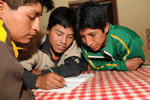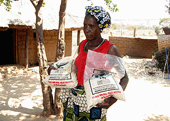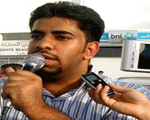Social Watch News
Published on Thu, 2013-07-11 09:05
On June 25 and 26 June 2013, the Vienna+20 CSO Conference of more than 140 persons from various CSOs around the world gathered at Vienna on the occasion of the 20th anniversary of the 1993 World Conference on Human Rights and its Vienna Declaration and Programme of Action issued on June 25, 1993. Social Watch was represented by Kinda Mohamadieh. |
Published on Wed, 2013-07-10 17:56
Emerging from a sustainable development discourse saturated by “experts”, “eminent persons”, and professionals, the knowledge of people living in extreme poverty, based on lived reality, is crucial to the debate. The International Movement ATD Fourth World organized a two-day seminar, with participants who experience daily hardship, to demonstrate that those who have lived extreme poverty are best equipped to end it. Present at the seminar were also Amina Mohammed, Special Advisor of the Secretary-General on Post-2015 Development Planning; Olav Kjorven, Assistant Secretary-General at the United Nations Development Programme; as well as academics from Oxford University, UK, and practitioners in the field. |
Published on Tue, 2013-07-02 00:00
In July 2012 after the Rio+20 Conference was held, the UN Secretary General with the support of the UN agencies launched a process to discuss the Post-2015 development agenda. He commissioned to very specific stakeholders four reports that have just been delivered and will serve as an input to his report to the September 2013 General Assembly Special Event on the Millennium Development Goals (MDGs) and the Post-2015 Development Agenda. The four stakeholders that prepared and submitted reports to the UN Secretary-General are the High Level Panel of Eminent Persons on the Post-2015 Development Agenda (Post-2015 HLP), the UN Sustainable Development Solutions Network (SDSN), the UN Global Compact (UNGC), and the UN Development Group (UNDG). |
Published on Mon, 2013-07-01 00:00
After five months of negotiations, UN Member States agreed on the resolution text that defines the format, functions and organizational aspects of the high-level political forum on sustainable development (HLPF or the forum). The resolution will now be formally adopted by the United Nations General Assembly. The HLPF will be the intergovernmental institution in the UN mandated to “provide political leadership, guidance and recommendations for sustainable development, follow-up and review progress in the implementation of sustainable development commitments, [and] enhance the integration of the three dimensions of sustainable development in a holistic and cross-sectoral manner at all levels.” Its establishment was decided by Member States during the UN Conference on Sustainable Development (Rio+20) held in Rio de Janeiro in 2012. |
| Source: . Published on Mon, 2013-07-01 00:00 |
| Published on Fri, 2013-06-28 00:37 |
Leave No One Behind: The agenda of the United Nations should respect Nature and listen to the people
“The worst thing about living in extreme poverty is the contempt - that they treat you like you are worthless, that they look at you with disgust and fear and that they even treat you like an enemy.” “We experience the violence of being discriminated against, of not existing, not being part of the same world, not being treated like other human beings.” Time and again, poverty is associated with violence against the people that suffer it. Poverty is frequently a consequence of human rights violations and also a symptom of them. The first quote is from a person living in poverty in Peru. The second from a person in France. The feelings expressed are essentially the same, even when the countries in which they live may be officially classified under very different economic standards. |
Published on Wed, 2013-06-26 08:40
This report tracks the extent to which Zambia is making progress towards achieving the MDGs focuses on Goals 1 to 7 and assesses Zambia’s national development plans, the main tools for achieving economic and human development, particularly the Fifth National Development Plan (FNDP). It also analyses problems in the way the MDGs are formulated, arguing that unless these are taken care of, the human development conditions of countries such as Zambia will remain poor for a long time. Finally, it makes proposals for post 2015 reform. At the launch of the MDGs in 2000, Zambia’s human development indicators were weak, owing to the steady deterioration of the economic and social conditions since the mid-1970s, when prices of its main produce copper fell on the world market. From the late 1980s and 1990s Zambia implemented the World Bank and the International Monetary Fund inspired Structural Adjustment Programme (SAP), under which significant cuts to public expenditure were applied, considerably weakening delivery of social services in the health, education and other sectors. This period is also when the HIV and AIDS pandemic hit Zambia the hardest. |
Published on Tue, 2013-06-25 00:00
The Gulf Center for Human Rights (GCHR) and Bahrain Center for Human Rights (BCHR) express their serious concern over ongoing campaign of judicial harassments against human rights defenders in Bahrain, that includes the very recent trial of defender Mohamed Al-Maskati on freedom of assembly related charges. |
| Published on Thu, 2013-06-20 19:26 |
SUSCRIBE TO OUR NEWSLETTER










